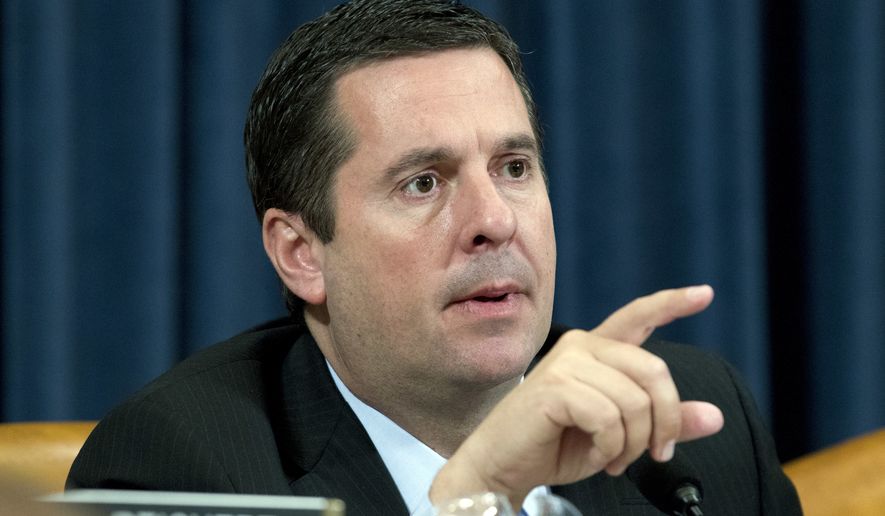A House committee wants intelligence agencies to declassify the censored parts of its final report on Moscow election interference in light of the fact that special counsel Robert Mueller’s indictment this month of 12 Russians contains some of the same information.
A congressional source said the House Permanent Select Committee on Intelligence will make the request to free up huge sections of Chapter 2, “Russia Attacks the United States,” of its March report that have been blacked out, or redacted, by the intelligence community.
It marks a new fight between Rep. Devin Nunes, California Republican and committee chairman, and the intelligence bureaucracy over the contested issue of disclosing as much information as possible on the ongoing Trump-Russia probe.
In another scuffle, Mr. Nunes is going eye-to-eye with the Justice Department over his request for more documents on how the FBI began its counterintelligence probe into the Trump campaign and the use of confidential human sources, or spies.
In the Russia indictment, the intelligence community apparently allowed Mr. Mueller to release the same sensitive information it had blocked in the House Republican majority report, according to congressional sources.
A spokesman for Mr. Mueller declined to comment when asked by The Washington Times if the intelligence community approved the indictment’s narrative that buttressed charges against 12 Russian intelligence officers.
The Director of National Intelligence public affairs office declined to comment.
Mr. Mueller’s indictment is, in a sense, an intelligence report on how the Russian intelligence group GRU, operating from Moscow headquarters, launched cyberwarfare on Democratic Party computers.
It detailed how GRU of the Main Intelligence Directorate financed the operation for $95,000 using “mined” and purchased bitcoins, a cryptocurrency that allows more anonymity than a traditional bank transaction. The indictment told of how officers set up phony personas to acquire bitcoins to rent servers and buy internet domains around the globe.
The GRU officers established two fake sites, DCLeaks and Guccifer 2.0, to release stolen Democratic emails and documents that became fodder for scores of news stories on the inner workings of the Hillary Clinton campaign. Eventually, the Guccifer site, run by a GRU officer, shipped emails to Wikileaks for wider circulation beginning in July 2016, the indictment said.
Mr. Nunes has a specific complaint about the indictment itself: It fails to mention Russian attempts to hack Republicans. His House report does so, in an attempt to show the Russians were looking for dirt on Donald Trump and the GOP as well as Democrats.
“The indictment plays like they’re only going after the Democrats, when Bob Mueller and all his investigators and his lawyers know for a fact that they also targeted Republicans,” Mr. Nunes told Fox News. “Why is that not in the indictment? It makes the indictment look ridiculous.”
The Russians’ attempted hacking of the GOP remains shrouded in secrecy. The Republican National Committee simply says it was not penetrated. The Wall Street Journal reported that Russia attempted to hack GOP computers via email addresses but failed.
Some news stories said the RNC maintained better cyber defenses than did the Democratic National Committee and the Clinton campaign.
The intelligence community’s bottom line assessment is that Russia hacked the Democrats to help candidate Trump.
What Russia would have done with insider RNC information may never be known. Mr. Nunes said the Justice Department and the Mueller team “know that. It’s in our report,” referring to attempted Republican hacks.
“So why doesn’t … Department of Justice allow this to be declassified, so the American public can see this?” he asked.
Mr. Nunes sees his committee’s final report as a vindication since, he says, it mirrors what Mr. Mueller put in the indictment.
“And then it looks like all you did, all that Mueller did, was validate our report, indict some Russians and leave out, I think, some very pertinent, relative evidence that the American public should see, which is why we continue to have to fight,” he said.
Of Chapter 2’s 15 pages, nine deal with how the Russians hacked the Democrats. Five pages are blacked out entirely; the other four are heavily censored.
Free of extensive censorship are the pages on how Russia used Facebook and Twitter for social media ads and fake news.
“This entire report that you have in front of you — all you had to do was get page four, and you only had to read Chapter 2, and you would have had nearly everything that’s in the indictment,” Mr. Nunes said.
• Rowan Scarborough can be reached at rscarborough@washingtontimes.com.




Please read our comment policy before commenting.